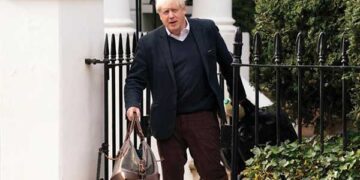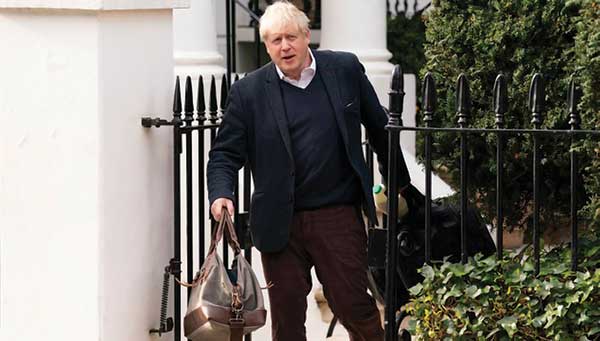Mukesh Kacker
On March 22, a privileges committee of the British House of Commons grilled former Prime Minister Boris Johnson for over three hours to establish whether he had lied to or misled the Parliament about holding boozy parties in 10 Downing Street and breaking rules during the Covid lockdown. The entire exercise was fantastic not because it displayed the transparency of British democracy but because it stretched the limits of human credulity. What exactly was happening?
Yes, the committee was being very fair by giving Boris a chance to speak but the proceedings and the aftermath left me absolutely bewildered. Why and how do you prove something which already stands proved beyond all doubt? And yet, there were interviews with renowned intellectuals and political scientists on British news channels after the committee concluded its hearing on whether Boris had created enough doubt to escape censure. I will be damned! Was I so stupid as to be missing some really fine intellectual nuances of this issue so clearly visible to the British mind but beyond my comprehension?
Toll of the pandemic
To put things in perspective, let me state the recorded facts here. During the Covid crisis of 2019-2022, we had a Prime Minister called Boris Johnson who, as the head of the UK Government, took all the decisions regarding lockdowns or movement or social distancing norms.
He was on the national TV almost every alternate day holding forth on the Covid situation, on lockdown rules and on social distancing norms. When news leaked that all this while he was having parties at 10 Downing Street in violation of the rules, he first denied that in the Parliament (if this is not lying what is?) and then tried to justify those parties as work events. With more leaks and more public outrage an inquiry under the senior civil servant Sue Gray was instituted. It took forever for the inquiry report to come out but when it did it left nobody in doubt that Boris had been lying all along. In between a police investigation by the Metropolitan Police also established that Boris had broken rules and he was fined accordingly.
With so much disclosure and evidence all that remained for the Parliament was to conduct a deposition of Boris before a specially constituted privileges committee of the House of Commons, so that he could be censured and sanctioned in accordance with procedure. As the then serving PM, Boris did his best to manipulate the submission of a watered down version of Sue Gray’s report to the privileges committee and a heavily redacted copy of her report was submitted. Do you need more proof that he was still trying to mislead the Parliament intentionally? Eventually a non-redacted version of the report with all evidence was duly submitted to the committee when Rishi Sunak became the PM.
Dubious deposition
Now let us come to the most interesting part of this drama – Boris’ deposition before the committee. To be fair to him I must compliment him for his creativity in intellectualising his sins and presenting them as strengths worthy of applause. He virtually inundated the committee with so much verbiage that the committee was forced to respond to his utterly juvenile arguments. What was his main argument? It was that though he did mislead the Parliament, he did not do it ‘intentionally’? Brilliant, isn’t it? A Prime Minister (former) lying to the Parliament repeatedly, putting barriers in the submission of the inquiry report to the Parliament, and claiming that he did not do it intentionally! And what are your arguments for claiming that you didn’t do it intentionally, Mr. Johnson?
Whither logic?
Now consider the two fantastic arguments he gave. First, that he had not been cautioned or advised by anybody from his staff or the Government that he was breaking rules. Seriously! Can this be considered a reason or an argument? Anyway, wait till you hear his second argument. Second, he claimed that since so many from his staff and the civil service were attending those parties it was proof that they all thought they were not breaking rules and so he actually believed he was not breaking rules. I don’t know whether I should laugh or cry! He is actually turning logic on its head. An instance of twenty-thirty odd persons breaking the law together is actually more serious than two persons breaking it but just see how Boris is claiming exemption by saying “everybody was doing it so it wasn’t a big thing”. Modern sophistry at its best, or shall we say, worst.
In ancient Greece the original sophists were teachers who specialised in philosophy, metaphysics, arts, culture, language and music and who employed rhetoric to persuade and convince others. They were men of wisdom and learning. However, in the present day a sophist refers to someone who deliberately argues using fallacious arguments or reasoning, in order to mislead. Sophistry in modern day politics is quite prevalent but Boris Johnson has indeed elevated it to dizzying heights.

ABOUT THE AUTHOR
Former Indian Administrative Service officer Mukesh Kacker writes for various publications in India on economy and business. With three decades of experience in the Government, Kacker works as an independent advisor to companies, helping them strategise their activities besides holding Board level positions. He is an Independent Director on the Board of Capri Global Capital Ltd. Kacker has done Masters in Public Administration from John F Kennedy School of Government, Harvard University. Living in London and pursuing the Financial Times Post Graduate Diploma for Non-Executive Directors, Kacker remains a keen observer of the British parliamentary democracy. He is deeply interested in the changing dynamics of the UK – India relations with specific focus on the ongoing negotiations for a free trade agreement (FTA). Email: kacker57@gmail.com
















